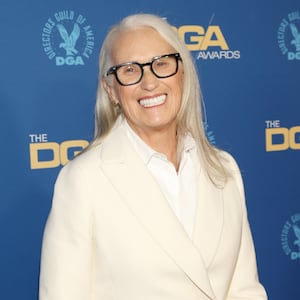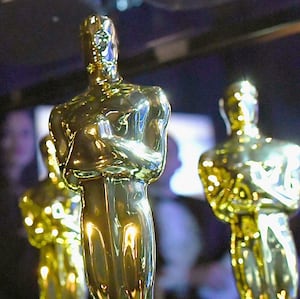The past 72 hours for The Power of the Dog director Jane Campion have been eventful, to say the least.
Over a hectic weekend ahead of the Oscars, the New Zealand filmmaker collected a slew of Best Director and Best Picture trophies at the Directors Guild Association Awards, The British Academy Film Association Awards, and last night’s Critics’ Choice Awards. At Saturday’s DGAs, she even earned praise for iconically calling actor Sam Elliott a “B-I-T-C-H” on the red carpet following his sexist, homophobic, and xenophobic critique of her abilities as a non-American filmmaker to direct a Western.
Unfortunately, the goodwill she built up from that remark on Twitter had seemingly run out by Sunday night when she accepted Best Director at the Critics’ Choice Awards and gave an awkward, ill-informed shout-out to Serena and Venus Williams, for which she’s now released an apology.
“I made a thoughtless comment equating what I do in the film world with all that Serena Williams and Venus Williams have achieved,” Campion said in a statement. “I did not intend to devalue these two legendary Black women and world-class athletes.”
Campion continued, “The fact is the Williams sisters have, actually, squared off against men on the court (and off), and they have both raised the bar and opened doors for what is possible for women in this world. The last thing I would ever want to do is minimize remarkable women. I love Serena and Venus. Their accomplishments are titanic and inspiring. Serena and Venus, I apologize and completely celebrate you.”
The cringeworthy comment occurred when The Piano director began her acceptance speech at the Critics’ Choice Awards by saluting the tennis champions, who were in the audience representing King Richard.
“What an honor to be in the room with you,” Campion said onstage. “I’ve taken up tennis. I truly have. And Will [Smith], if you want to come over and give me lessons, I would truly love it. I actually had to stop playing because I’ve got tennis elbow.”
She then shouted out her fellow all-male directing nominees before circling back to the Williams sisters, saying, “Venus and Serena, you’re such marvels. However, you don’t play against the guys like I have to.”
While the remark played well in the room, viewers online were quick to call out Campion for diminishing the Williams sisters’ experiences of sexism and more blatantly, racism, within their profession. One could argue that Campion’s comment is factually wrong, as the tennis pros have literally competed against men in doubles tournaments. But in the larger world of professional sports, the two have dealt with an overwhelming amount of misogyny from male players, journalists, and commentators—and in the social media age, a bunch of random men on the internet—regarding their athletic ability, physicality, presentation, on-court demeanor, and age.
But the Williams sisters have not just been publicly denigrated as female athletes, nor have they received these insults solely from men, as their identities are equally and essentially tied to—and in many cases, obscured by—their Blackness. You see this misogynoir most often in the way the press and even some fellow athletes—like Maria Sharapova in her 2017 memoir—have described Serena’s muscular build as abnormal, threatening, and masculine, and accused her of steroid use.
The siblings, who have both previously been ranked No. 1 in the world, have also had their accomplishments devalued by men in their industry, like the time tennis legend John McEnroe controversially claimed that Serena would place “700 in the world” if she played in the men’s circuit. Consistently, the sisters have dealt with harsher, crueler language from white tennis commentators, both male and female. They’ve been criticized for the way they interact with press and how they behave during matches. As they’ve aged, they’ve experienced disproportionate calls to retire, while male players like Roger Federer, Rafael Nadal, and Novak Djokovic are encouraged to keep playing. The list goes on.
While Campion seems to understand why the comparisons she made were harmful and offensive—although she made a similarly ignorant comment when she likened #MeToo to the “end of apartheid” last year— the fact that the remark was even uttered in the first place has already soured what was an exciting awards run and a notable achievement for a female filmmaker. She’s the first woman to be nominated for Best Director at the Oscars twice and is predicted to win this year, which would make her only the third woman to take home the prize.
In general, non-white women directors should receive more recognition for their contributions during awards season, simply because they deserve it as much as their white male and female peers. But as their so-called “sisters” in the industry continue to spew white feminist nonsense—from Emma Stone ignoring Jordan Peele’s Best Director nod as a Black man at the 2018 Oscars to Patricia Arquette urging people of color in 2015 to support women, as if those identities don’t overlap—their absence has never felt more crucial.








